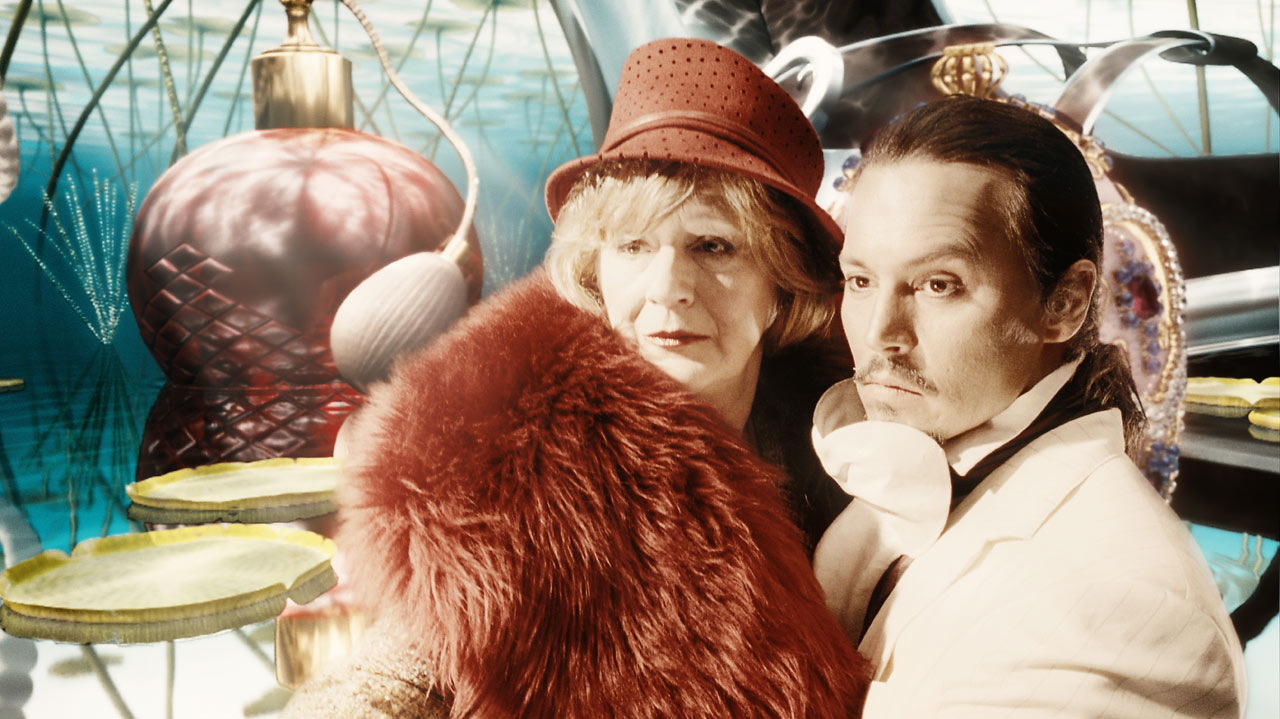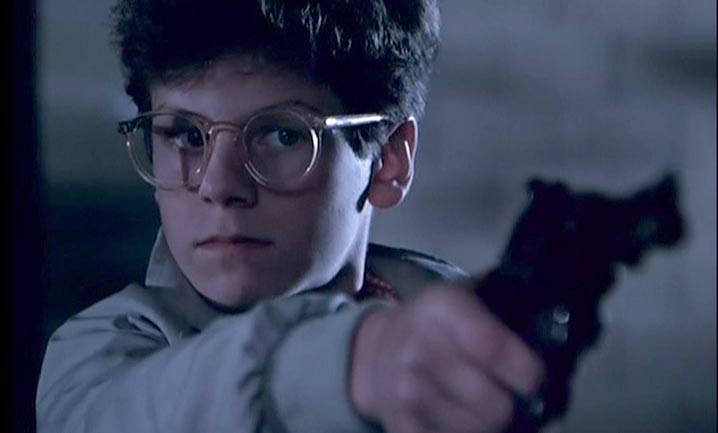Tideland
 Terry Gilliam has made a living out of movies that dance along the line separating the physical world from that of the imagination, serenity from hubbub, and sanity from madness. In a career that sprang from the organized chaos that was Monty Python, he has slept with the surrealists, danced with Jan Svankmajer, and kissed the sweaty brow of Tex Avery. His pictures have ranged from whimsical fantasy and uneasy science fiction to startling takes on the dementia that devours the very edges of our reality, occasionally swallowing human beings whole. While his missteps may well outnumber his outright triumphs, the Gilliam stalwart (and I do count myself among them) will find something effective and admirable, and likely something over-the-top brilliant, in almost every outing.
Terry Gilliam has made a living out of movies that dance along the line separating the physical world from that of the imagination, serenity from hubbub, and sanity from madness. In a career that sprang from the organized chaos that was Monty Python, he has slept with the surrealists, danced with Jan Svankmajer, and kissed the sweaty brow of Tex Avery. His pictures have ranged from whimsical fantasy and uneasy science fiction to startling takes on the dementia that devours the very edges of our reality, occasionally swallowing human beings whole. While his missteps may well outnumber his outright triumphs, the Gilliam stalwart (and I do count myself among them) will find something effective and admirable, and likely something over-the-top brilliant, in almost every outing.
But even a brilliant auteur’s career isn’t immune to total disaster. It’s some consolation, I suppose, that Gilliam himself didn’t even seem to have much invested in last year’s The Brothers Grimm train wreck, which is as depressingly workmanlike a project as he’s ever undertaken. At the same time Grimm was being finished, Gilliam was working on the considerably more personal Tideland — and, judging from the reaction at the press preview I attended, where I imagine nearly a third of the audience made its way toward the door mid-screening, he’s about to get savaged for it. (A week later, a woman sitting several rows behind me at another screening was still complaining about it.)
Well, what’s it about?
Jeliza-Rose is a young girl who seems (as kids sometimes do) not to have a full engagement with reality. Her father is a rock star and an addict, her mother just a junkie. She delivers dad’s needles to him so that he can go, euphemistically, “on vacation” for hours on end. When mom dies of an overdose, it must seem to her like just another trip. The whole idea of home having suddenly lost definition, Dad packs Jeliza-Rose up and moves into her grandmother’s old, abandoned house in a place that closely resembles the middle of nowhere (it’s actually Saskatchewan). While the two are living there, worse events still will transpire, and the child will absorb them uncomprehendingly and with great composure, inhabiting a fantasy world peopled by talking dolls’ heads and occasionally flooded with a beautiful, incandescent tide. This charm and grace, you sense, is not itself enough to save her from eventual calamity. Tideland is a film about the perils of being young and innocent in a dangerous and often uncaring world.
(The rest of this review is spoilerific.)
It’s also a provocation, to be sure. You could even say its conception is resolutely anti cinematic pleasure. Its ostensible star power — well, Jeff Bridges is a star and Jennifer Tilly is at least a familiar face — comes from actors playing two characters who are dead by the end of the first act. The painterly cinematography (Andrew Wyeth is referenced almost explicitly) emphasizes the lovely and bleak qualities of the Canadian locations, but only in the service of a terrible aloneness — and a bizarre waking nightmare that briefly threatens to turn this picture into Terry Gilliam’s Chainsaw Massacre. The film’s protagonist is a 10-year-old beauty of a child, but is also an orphan with dire prospects. Whatever joy she experiences — and this is crucial — is born specifically out of an innocence that Gilliam knows his audience won’t share.
The whole Tideland experience feels depressingly underdeveloped — relying on threadbare story and unpleasant caricature — and perhaps too grueling. But it’s rewarding, and there’s a fierce integrity to what Gilliam’s creating. That tension between the sensibilities of the child on screen — children, really, for the man-child Dickens whom she befriends isn’t quite firing on all cylinders and has the brain-scar to prove it — and the grown-ups watching it is Gilliam’s real subject. If his films consider fantasy and reality, this one is about childhood and adultness. It casts little Jeliza-Rose as the näif in perpetual jeopardy, and us in the audience as the parents, stricken with concern for her well-being — and unfortunately, necessarily, bereft of imagination. There is an amazingly fraught sequence where the girl and her surrogate guardian, the amiable Dickens, flirt with physical love. The prospect makes viewers queasy not just because we know that it’s not a healthy thing for grown men and young girls to have that kind of relationship, but also because both of the characters are innocents. They have no idea how much is at stake, or how close they are to the precipice. It’s here that the film flirts with cataclysm — and another reason these scenes are so squirmy is that, given some of the stuff that’s gone before, you can’t be sure Gilliam isn’t about to go completely off the deep end and show you something you’re not prepared to see.
Well, he doesn’t quite go there. The downward spiral is interrupted by a sort of machine ex machina — a locomotive that comes bursting into this film’s narrative machine, crashing across the countryside and offering up the small miracle of foster parentage. So it’s a happy ending, barely, but one that feels earned at the end of a grueling narrative pockmarked with moments of surreal beauty and horror and characterized by the stench of tumescent decay. (Sure, there are moments of good humor, too, like the motormouthed talking squirrel who tries to warn Jeliza-Rose of the ill that may befall her, but the film’s overall impact is enervating.)
One of the key moments in Gilliam’s oeuvre, for me, has always been that baffling, cheeky moment at the very end of Time Bandits when little Kevin’s parents fail to heed the kid’s warning about the bit of smoking rubble in the oven: “Mum! Dad! Don’t touch it! It’s evil!” And they’re summarily blasted into bits of fire and ash, leaving the kid to stagger forward, gaping, through his front yard in what must be a mixture of wonderment and terror. Gilliam seems barely concerned about him — tough break, kid — perhaps convinced that he’s been on a great adventure that obviates the need for parenting. If that’s the case, then he must figure that Jeliza-Rose, too, has been through the kind of shit that will make her a survivor. (I can’t help thinking, too, of Sarah Polley’s email exchange with Gilliam over Tideland and her work on The Adventures of Baron Munchausen.) So Tideland is a harrowing film, but a fundamentally optimistic one. It’s no masterpiece, but it is a haunting, serious picture — a crucial addition to Gilliam’s body of work, and an indicator that, after recent misfires, he could yet return to disturbing, invigorating form.
Posted by on October 10, 2024 6:23 PM Tideland" title="Still from
Tideland" title="Still from 
